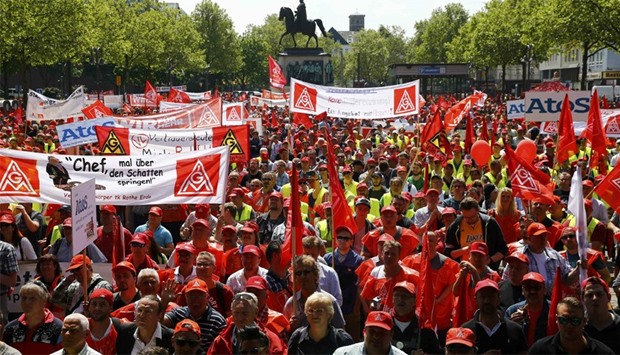In a so-called pilot agreement for the regional state of North Rhine-Westphalia -- which will serve as a benchmark for all 3.8 million workers in the sector nationwide -- employees will receive a one-off payment of 150 euros ($170) for the period from April to June 2016.
They will then see their pay rise by 2.8 percent on July 1 and again by 2.0 percent in April 2017, the mighty labour union IG Metall said in a statement.
The wage agreement, struck in the early hours of Friday, is valid for a period of 21 months. But it entails a clause allowing companies in financial difficulty to delay the one-off payment and the second stage of the increase, IG Metall said.
The union insisted the pay increase would ‘strengthen consumer demand,’ which is currently one of the main pillars of economic recovery in Germany.
‘At the same time, this is an agreement... which won't overstretch any firm,’ IG Metall said.
The head of the employers' federation Gesamtmetall, Rainer Dulger, described the pay deal as ‘just about affordable for companies.’
The previous wage agreement between the union and the employers' federation Gesamtmetall expired in March.
Since then, both sides had been negotiating to reach a new deal for a sector that covers a wide range of engineering industries, from the automobile sector to machine-tools and the electronics and electrical goods industries.
Unions had staged a series of so-called ‘warning strikes’, or limited walkouts, recently in a bid to turn up the pressure on the employers.
IG Metall had been demanding pay increases of five percent in view of the comfortable profit situation of many companies in the sector, while Gesamtmetall had offered of a pay rise of 2.1 percent over a two-year period.
- Benchmark for other sectors -
Wage negotiations in the metalworking industry act as a benchmark for most other sectors.
But with consumer spending also becoming an increasingly important pillar of economic recovery in Germany, economists hope the rising wages will provide additional momentum to growth as households' purchasing power increases.
In the past, salaries in Germany have risen only moderately, helping to boost the competitiveness of German companies.
But with many sectors of industry increasingly complaining about a shortage of qualified manpower, unions have used this as leverage to secure bigger pay increases.
At the end of April, workers in public administration won a 2.4-percent wage rise for this year.
Hotel workers in the southern state of Bavaria secured a 3.0-percent pay rise at the start of May.
Wage negotiations are still underway in other sectors, such as the chemicals and construction industries.
Economists at BayernLB said that this year's wage rounds cover as many as 11 million people. And on the basis of the deals reached so far, these workers could secure average pay increases of between two and three percent, compared with 2.5 percent last year.
In theory, these deals could help push up sluggish inflation in the euro area, the BayernLB economists said.
Germany accounts for around one-fifth of the entire euro area. And if Germans are paid more, they are likely to spend more, especially as low interest rates provide little incentive for them to save money.
That could help drive up inflation, especially as companies are compelled to raise the prices of the products to help pay for the increased wage costs.
But for the time being, such hopes are failing to be fulfilled -- consumer prices actually fell by 0.1 percent in April, according to the latest inflation data.
That is because companies ‘are facing fierce competition and are very reluctant to pass on higher costs to customers,’ said the BayernLB economists.
The European Central Bank, which is trying to drive inflation higher, cannot place its bets on the German wage deals, they said.
‘If we sell our products at a higher price, no-one will buy them,’ said Gesamtmetall chief Dulger.

